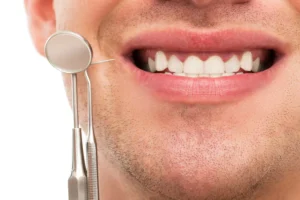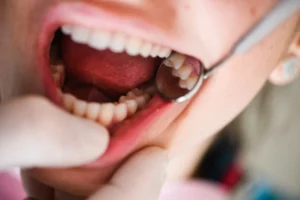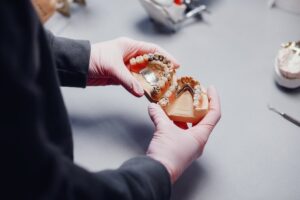Maintaining a healthy smile goes way beyond just brushing and flossing. Regular dental cleanings play a crucial role in achieving optimal oral health. But in this modern era, where people follow the famous proverb, “Time is Money,” asking themselves, “How long does a dental cleaning take?” is usual.
Understanding the duration of a dental cleaning can help you plan your schedule and alleviate any concerns. The actual time of this procedure depends on a number of factors, such as the condition of your oral health, the amount of tartar buildup, and any existing dental issues that can impact the cleaning procedure’s length.
Read this blog as we dig deeper into how long a dental cleaning takes, how often you should get your teeth cleaned, advantages and disadvantages, and costs related to teeth cleaning.
What is Dental Cleaning?
Regular dental cleanings are vital for your good oral health. A trained dentist or dental hygienist will methodically remove harmful bacteria, plaque, and hard tartar accumulation from the surfaces of your teeth during a dental cleaning. They may also perform other preventive treatments, such as administering dental sealants and fluoride, in addition to a thorough cleaning.
How Often Should You Get a Dental Cleaning?
The American Dental Association (ADA) recommends scheduling a dental cleaning every six months. Fortunately, many dental insurance companies pay for these cleanings if scheduled six months apart.
Regular dental cleanings are essential for maintaining and improving your oral health. Following a recommended routine helps you proactively care for your teeth and gums, avoiding potential dental concerns and maintaining a healthy, bright smile.
How Long Does A Dental Cleaning Take?
Your oral health determines the duration of a dental cleaning. It usually takes approximately 30 minutes if your teeth are healthy and clean. If you have dental health issues, such as cavities or tartar accumulation, it may take up to an hour. Maintaining good oral health will help you spend less time during your dental cleaning session.
Factors Affecting the Duration of a Dental Cleaning

Several factors determine the length of dental cleaning:
- Oral Health: The cleaning process will move quickly if you have good oral health.
- Tartar Buildup: More tartar on your teeth indicates a more time-consuming cleaning procedure.
- Dental issues: Gum disease or tooth decay, may necessitate additional treatment time during the cleaning.
- Patient Cooperation and Comfort: The cleaning length is affected by your level of cooperation and comfort. Communicating any discomfort aids in the process’s efficiency.
- Dental Cleaning Frequency: Regular cleanings result in shorter appointments. Maintaining dental health requires consistency and adhering to the appropriate routine.
Advantages of Teeth Cleaning

Regular dental cleanings provide various advantages, including:
- Reduced risk of oral health problems: Routine cleanings reduce the likelihood of contracting significant disorders such as cavities and gum disease.
- Improved overall health: It is generally recognized that your overall health is directly linked with your oral health. Regular cleanings can help reduce the chance of developing illnesses like heart disease, stroke, and dementia.
- Bad breath: Bad breath can be prevented by removing hardened plaque and tartar. Routine cleanings help prevent halitosis by eliminating harmful germs from the surfaces of the teeth.
- Cost savings: Preventive dental care, including cleanings, catches problems before they become serious. This proactive strategy can save you time, concern, and money in the long run.
Disadvantages of Teeth Cleaning
After a dental cleaning, you may experience the following:
- Tooth Sensitivity: This is caused by the removal of tartar and the exposure of clean tooth surfaces.
- Gum Soreness: A temporary soreness in the gums can be caused by removing plaque and tartar. Over-the-counter pain medicines and saltwater rinses can provide relief.
- Gum bleeding: This occurs particularly in cases of severe periodontal disease. The swelling usually goes away within a few days. If there is persistent swelling or infection, antibiotics may be administered.
- Noticeable Gaps: Cleaning can show initial gaps between teeth filled over time with food particles, plaque, and tartar. These holes may have already existed but have yet to be noticed or become less noticeable.
How Much Does It Cost to Get Your Teeth Cleaned?
The dental cleaning cost varies depending on the dentist’s office and location and ranges typically from $75 to $500. A dental hygienist usually performs the cleaning technique during the cleaning session, while the dentist performs the examination. X-rays are frequently used to evaluate the condition of your teeth beneath the gum line.
Dental Cleaning Cost with Financing
At Valley Ridge Dental, we offer low-cost, high-quality dental care. We can offer reasonable costs because we provide many procedures, including cleanings and restorative treatments.
We understand that financial constraints should not prevent you from receiving vital care. Please contact our Lake Elmo office to talk with our financial coordinator if you have any questions about insurance or financing possibilities. Your dental health is our priority, and we are here to help.
Conclusion
Regular dental cleanings are an integral part of maintaining oral health. By understanding the factors that influence the duration of dental cleaning and following the provided tips, you can make the most of your dental cleaning appointments.Proactive oral care and cooperation with your dental professional are critical to a healthy smile. Schedule your next dental cleaning and embrace its benefits for your overall well-being.






